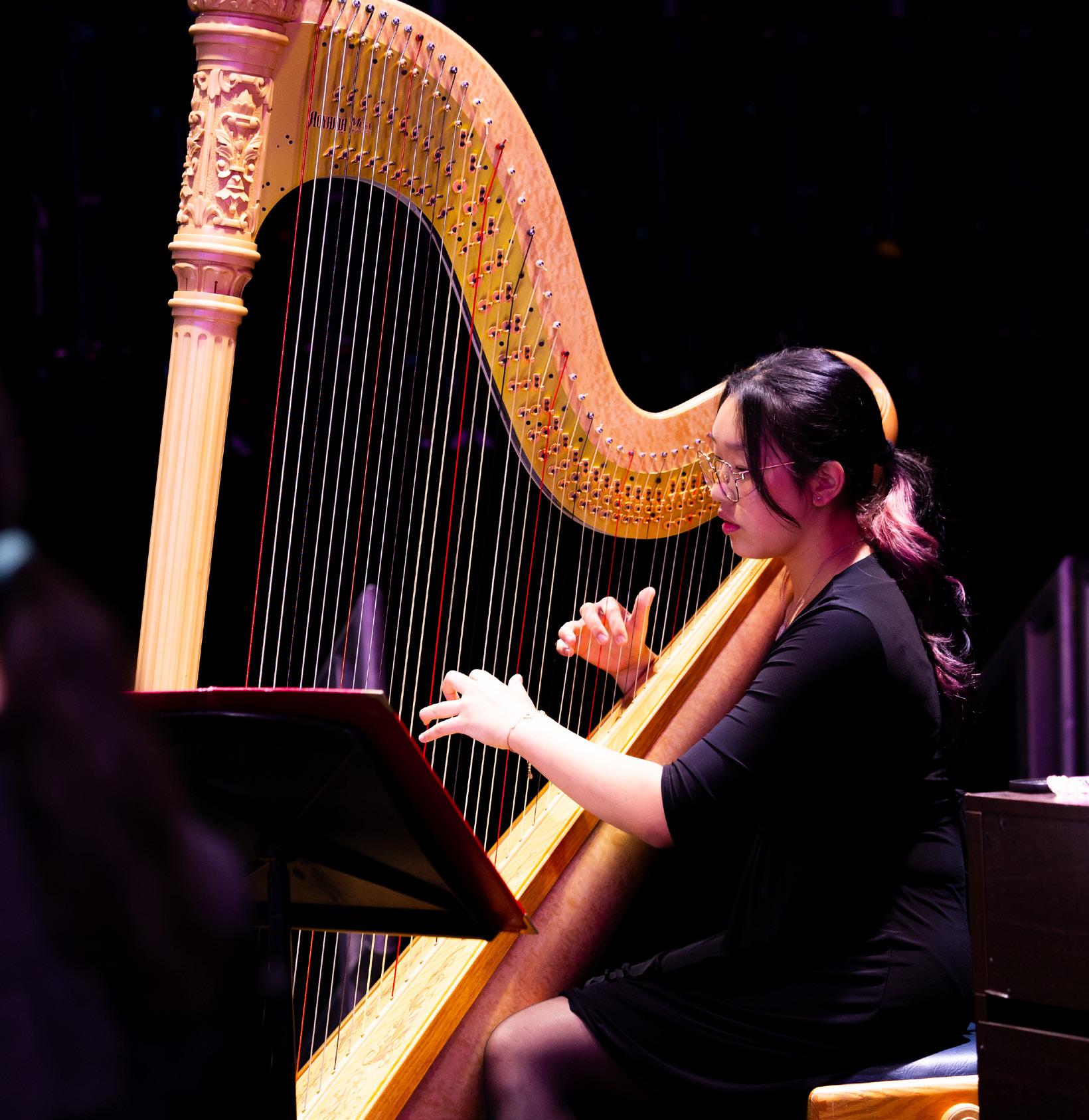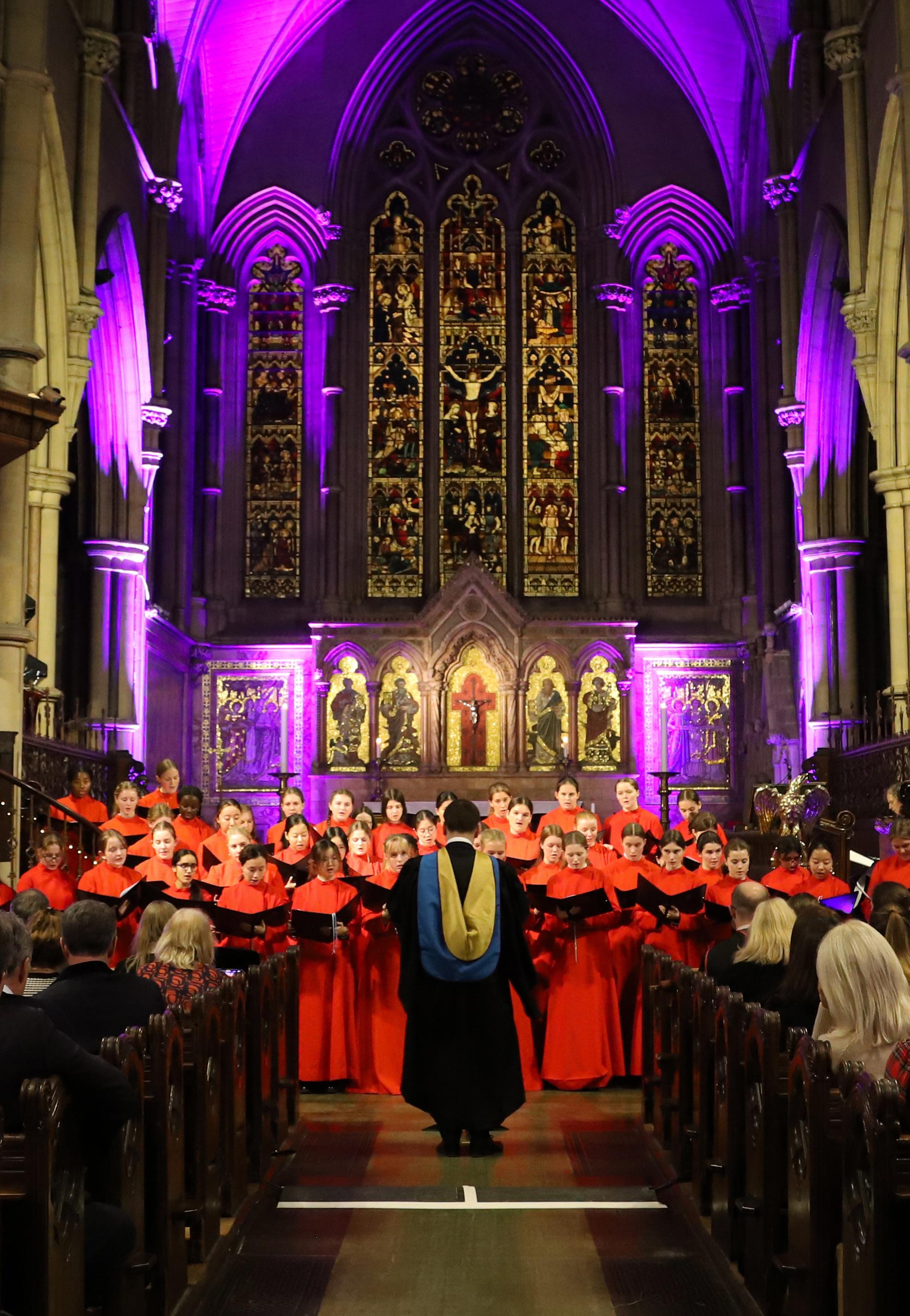

MUSIC SCHOLARSHIPS AND AWARDS
Music Scholarships and Awards
Downe House has a thriving Music department with a strong reputation, and our Music Award Holders play a leading role in the musical life of the school. They perform as soloists, in chamber groups and are members of instrumental and vocal ensembles, playing with enthusiasm and showing musical leadership to others in the school.
Types of Award
There is a range of Music Awards available.
• Music Scholarship (open to all years of entry)
• Music Exhibition (open to all years of entry)
• Organ Scholarship (16+ only)
• Organ Award (open to all years of entry)
• Chilcott Choral Scholarship (internally awarded)
• Choral Awards (open to all years of entry)
o Lower School Choral Award
o Upper School Choral Award
o Sixth Form Choral Award
The offer of an Award very much depends on the musicianship of the candidate, the standard on the instruments or voice offered, and critically, their musical potential, commitment and enthusiasm for music.
Value of Awards
• Music Scholars receive up to a maximum of 30 lessons of free tuition on two instruments each academic year
• Music Exhibitioners receive up to a maximum of 30 lessons of free tuition on one instrument (not voice) each academic year
• Organ Scholars receive up to a maximum of 30 lessons of free tuition on the organ and on an additional instrument each academic year
• Organ Award Holders receive up to a maximum of 30 lessons of free organ tuition each academic year
• Chilcott Choral Scholars receive up to a maximum of 30 lessons of free vocal tuition each academic year and fees for one Grade 8 performing examination
• Choral Award Holders receive up to a maximum of 30 lessons of free vocal tuition each academic year
It is anticipated that pupils will hold one Award, but in the very exceptional circumstances where a pupil holds more than one Award, free tuition is limited to two studies.
An individually tailored music mentoring programme is provided exclusively for all our Music Award Holders to support their musical development and enrich their experience of music at Downe House.
The mentors are full-time music staff at the school and will meet fortnightly with the award holders to support them with their music studies at the school.
The Music Award Holders will work with their mentor to set regular targets that the musicians can work towards each term. These mentoring sessions also provide support to our musicians with practical and logistical help, such as with music practice, repertoire choices and their cocurricular music involvement at the school.
A Music Award includes regular accompanying sessions with the Principal Accompanist, advanced aural coaching sessions and many performance opportunities throughout the academic year. These include Music Award Holder Recitals, lunchtime concerts, chamber music performances, masterclasses and largescale ensemble concerts.
Organ and Choral Scholarships include optional Oxbridge organ and choral scholarship mentoring.
For applicants for a Music Scholarship and Exhibition, candidates should offer two instruments (which may include voice) and have at least the following standard for their principal instrument with merit or distinction (preferably distinction):
o 11+ Grade 4-5
o 12+ Grade 5
o 13+ Grade 6
o 14+ Grade 7
o 15+ Grade 7-8
o 16+ Grade 8
• Organ Scholarship candidates should have Grade 6 and above keyboard skills. They should play the organ and one other instrument, which could include the piano or voice
• Organ Award candidates should be at Grade 5 piano standard or higher, with at least 6 months’ experience of playing the organ
• Chilcott Choral Scholarship candidates should be around Grade 6 voice or higher (internally awarded)
• Choral Award candidates should be around Grade 5 voice or higher
There is no set standard for subsidiary instruments, but the higher the standard, the more this will strengthen a candidate’s application.
Duties for Music Award Holders:
• To take a full part in the vibrant and rewarding musical life of the Department with enthusiasm and commitment, embracing the wide range of musical activities offered at Downe House
• To strive for excellence across all their musical studies
• Display self-discipline in their practice routines and commitment to ensembles throughout the academic year
• Music Scholars are expected to take part in a minimum of 3 co-curricular music ensembles at the school.
• Students with a Music Exhibition are expected to take part in a minimum of 2 co-curricular music ensembles at the school.
• To perform regularly, including at one of the Music Award Holders’ Recitals each year
• All Music Award Holders are expected to sing in at least one choir as well as other ensembles linked to their musical specialism during their time at the school.
• To study Music at GCSE
• Meet regularly with their Music Mentor, who is a member of the full-time music staff at the School
• To be a musical or choral ambassador, encouraging others to enjoy music by example and through displaying musical leadership
How to apply for a Music Award
If your daughter is registered and has received a conditional offer to join Downe House, the Registry will automatically write to you in November/ December of the year prior to entry with details of how to apply for Awards.
In order to proceed, we will require two references; one from your current Head of Music and a second music reference, usually your instrumental/vocal teacher. Awards are made on the basis of an audition and interview in January/February of the year of entry and references must be received prior to audition.
Candidates must prepare a short performance. For all Awards (apart from the Chilcott Choral Scholarship), two contrasting pieces on their principal instrument/voice should be prepared.
For all Awards, apart from the Choral Award and Chilcott Choral Scholarship, one piece should be performed on each of their subsidiary instruments. In addition, each candidate will be given sight-reading/singing, a short series of aural tests, and there will be a short interview. Any compositions or special musical projects which the candidate may have completed would be of interest.
For a Choral Award or Scholarship, there will also be a vocal range test.
All music intended for performance with piano accompaniment must be performed with the Downe House accompanist. All candidates will be given the opportunity to rehearse with the accompanist before their audition.
Overseas candidates may request a virtual audition if required.
The audition is designed to discover musical potential and the candidate’s enthusiasm for music, as much as to assess performance achievement and attainment.
Further details regarding Music Scholarships and Awards are available from the Director of Music, Mr Alex Leadbeater (leadbeatera@downehouse. net).
Pre-auditions are welcomed to assist candidates in their long-term preparation for a Music Award (1-2 years prior to audition).
For general enquiries about Scholarships please contact Miss Angela Nutt, Registrar, via email: nutta@downehouse.net or telephone: 01635 204701

Choral Award
There are three types of Choral Award which can be awarded at all years of entry to the School:
• Lower School Choral Award. These are awarded to girls in the Remove and Lower Fourth and are held until the end of the Lower Fourth year
• Upper School Choral Award. These are awarded to girls in Upper Fourth, Lower Fifth and Upper Fifth and are held until the end of the Upper Fifth year
• Sixth Form Choral Award. These are awarded to girls in Lower Sixth or Upper Sixth and are held until the end of the Upper Sixth year
Who should apply?
Candidates should have a background of singing regularly in a choir(s) and experience of choral singing in parts. As a guide, they may have received individual tuition in singing and may be working towards ABRSM exam grades. They should be around Grade 5 standard or higher. A second instrument is desirable but not essential for this award.
Chilcott Choral Scholarship
Chilcott Choral Scholarships are awarded through an internal process at 16+. It is not open to new entrants. The renowned composer, conductor and singer, Bob Chilcott, will work with the Chilcott Choral Scholars during his termly visits to Downe House.
Who should apply?
Candidates will have exceptional choral potential with a strong background of choral singing in parts. They will possess a natural choral instinct and demonstrate a genuine passion and enthusiasm for singing in choirs.
As a guide, they may have received individual tuition in singing, may be working towards ABRSM exam grades and should be around Grade 6 standard or higher. A second instrument is desirable but not essential. It is expected that candidates will have attained their Grade 5 Theory.
The Chilcott Choral Scholarship could form the ideal preparation for a University Choral Scholarship.

FREQUENTLY ASKED QUESTIONS
What type of pieces should be performed for the audition?
Candidates applying for a Music Scholarship and Exhibition are asked to perform two contrasting pieces on their principal instrument (which may include the voice) and one piece on each of their subsidiary instruments. The two pieces on the principal instrument should allow the candidate to demonstrate their ability to play contrasting repertoire both accurately and musically as well as demonstrating good technical abilities on the instrument/voice.
What is expected in the sight-reading tests?
As part of the scholarship audition, candidates will be given a piece of sight reading/singing on their principal instrument/voice. The standard of sight-reading tests will be at the level equivalent to the grade requirement specified for the Scholarship audition (11+ Grade 4/5; 12+ Grade 5; 13+ Grade 6; 16+ Grade 8). Candidates will be given a short amount of time to study the extract of music and have a go at playing any parts of the extract before we hear the whole sightreading extract in the audition.
What is to be expected in the aural tests?
There will be a series of four or five short aural tests which will include pitch and rhythm tests, sight singing as well as identifying musical features from hearing an extract of music. The standard of aural tests will be at the level equivalent to the grade requirements specified for the Scholarship audition (11+ Grade 4/5; 12+ Grade 5; 13+ Grade 6; 16+ Grade 8).
What is the purpose of the interview as part of the scholarship process?
The interview part of the scholarship audition is more of an informal discussion to find out a candidate’s musical experiences and the extent of her interest in music. It is important that candidates are aware of the expectations of a Music Award Holder at Downe House and are able to communicate their enthusiasm for Music here.
Are there any other aspects of music considered as part of a Music Scholarship application?
Yes, everything that would allow the student to contribute to the musical life of the school will be considered. This could include an enthusiasm for composition (e.g. fanfares, carols, songs), a willingness to organise small-scale concerts, an interest in concert visits and music recording or music technology amongst others.



